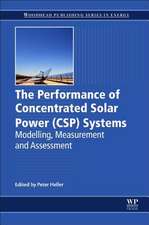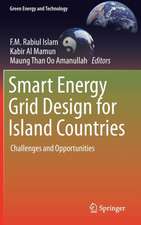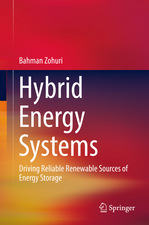Distributed Linear Programming Models in a Smart Grid: Power Electronics and Power Systems
Autor Prakash Ranganathan, Kendall E. Nygarden Limba Engleză Hardback – 6 apr 2017
This book showcases the strengths of Linear Programming models for Cyber Physical Systems (CPS), such as the Smart Grids. Cyber-Physical Systems (CPS) consist of computational components interconnected by computer networks that monitor and control switched physical entities interconnected by physical infrastructures. A fundamental challenge in the design and analysis of CPS is the lack of understanding in formulating constraints for complex networks. We address this challenge by employing collection of Linear programming solvers that models the constraints of sub-systems and micro grids in a distributed fashion.
The book can be treated as a useful resource to adaptively schedule resource transfers between nodes in a smart power grid. In addition, the feasibility conditions and constraints outlined in the book will enable in reaching optimal values that can help maintain the stability of both the computer network and the physical systems. It details the collection of optimization methods that are reliable for electric-utilities to use for resource scheduling, and optimizing their existing systems or sub-systems. The authors answer to key questions on ways to optimally allocate resources during outages, and contingency cases (e.g., line failures, and/or circuit breaker failures), how to design de-centralized methods for carrying out tasks using decomposition models; and how to quantify un-certainty and make decisions in the event of grid failures.
| Toate formatele și edițiile | Preț | Express |
|---|---|---|
| Paperback (1) | 778.45 lei 6-8 săpt. | |
| Springer International Publishing – 18 iul 2018 | 778.45 lei 6-8 săpt. | |
| Hardback (1) | 784.48 lei 6-8 săpt. | |
| Springer International Publishing – 6 apr 2017 | 784.48 lei 6-8 săpt. |
Din seria Power Electronics and Power Systems
- 18%
 Preț: 944.19 lei
Preț: 944.19 lei -
 Preț: 487.37 lei
Preț: 487.37 lei - 20%
 Preț: 630.01 lei
Preț: 630.01 lei - 15%
 Preț: 648.56 lei
Preț: 648.56 lei - 15%
 Preț: 643.84 lei
Preț: 643.84 lei - 18%
 Preț: 1113.89 lei
Preț: 1113.89 lei - 18%
 Preț: 1120.99 lei
Preț: 1120.99 lei - 18%
 Preț: 950.33 lei
Preț: 950.33 lei - 18%
 Preț: 1981.53 lei
Preț: 1981.53 lei - 15%
 Preț: 638.43 lei
Preț: 638.43 lei - 18%
 Preț: 1660.95 lei
Preț: 1660.95 lei - 18%
 Preț: 940.87 lei
Preț: 940.87 lei - 15%
 Preț: 637.46 lei
Preț: 637.46 lei - 18%
 Preț: 949.55 lei
Preț: 949.55 lei - 18%
 Preț: 953.65 lei
Preț: 953.65 lei - 18%
 Preț: 953.97 lei
Preț: 953.97 lei - 18%
 Preț: 944.67 lei
Preț: 944.67 lei - 15%
 Preț: 634.32 lei
Preț: 634.32 lei - 18%
 Preț: 832.78 lei
Preț: 832.78 lei - 18%
 Preț: 945.30 lei
Preț: 945.30 lei - 18%
 Preț: 1239.85 lei
Preț: 1239.85 lei - 15%
 Preț: 642.18 lei
Preț: 642.18 lei - 18%
 Preț: 1656.08 lei
Preț: 1656.08 lei - 18%
 Preț: 953.65 lei
Preț: 953.65 lei - 18%
 Preț: 1554.09 lei
Preț: 1554.09 lei - 18%
 Preț: 1657.03 lei
Preț: 1657.03 lei - 18%
 Preț: 951.47 lei
Preț: 951.47 lei - 18%
 Preț: 888.31 lei
Preț: 888.31 lei - 18%
 Preț: 1219.01 lei
Preț: 1219.01 lei - 18%
 Preț: 893.53 lei
Preț: 893.53 lei - 18%
 Preț: 942.94 lei
Preț: 942.94 lei - 18%
 Preț: 1110.24 lei
Preț: 1110.24 lei - 15%
 Preț: 641.85 lei
Preț: 641.85 lei
Preț: 784.48 lei
Preț vechi: 956.68 lei
-18% Nou
Puncte Express: 1177
Preț estimativ în valută:
150.12€ • 160.52$ • 125.16£
150.12€ • 160.52$ • 125.16£
Carte tipărită la comandă
Livrare economică 18 aprilie-02 mai
Preluare comenzi: 021 569.72.76
Specificații
ISBN-13: 9783319526164
ISBN-10: 3319526162
Pagini: 213
Ilustrații: XXV, 213 p. 67 illus., 54 illus. in color.
Dimensiuni: 155 x 235 x 14 mm
Greutate: 0.51 kg
Ediția:1st ed. 2017
Editura: Springer International Publishing
Colecția Springer
Seria Power Electronics and Power Systems
Locul publicării:Cham, Switzerland
ISBN-10: 3319526162
Pagini: 213
Ilustrații: XXV, 213 p. 67 illus., 54 illus. in color.
Dimensiuni: 155 x 235 x 14 mm
Greutate: 0.51 kg
Ediția:1st ed. 2017
Editura: Springer International Publishing
Colecția Springer
Seria Power Electronics and Power Systems
Locul publicării:Cham, Switzerland
Cuprins
Introduction.- Literature Review.- Energy Reallocation in a Smart Grid.- Resource Allocation Using Branch and Bound.- Resource Allocation Using DW Decomposition.- Implementation and Testing of DW Procedure.- Remarks on DW
A Linear Classifier for Decision Support in a Smart Grid.- PMU Placement Problem Using Linear Programming.- Unbiased Optimum Power Flow in Power Systems Using Linear Programming with Wind Generation Models.- Smart Grid Optimization Using a Capacitated Transshipment Problem Solver.- Decomposition of Microgrids in Large Scale Electric Test Beds for Economic Dispatch Optimization.- References
Notă biografică
Dr. Prakash Ranganathan is Assistant Professor of Electrical Engineering at University of North Dakota (UND), Grand Forks, North Dakota, USA. He is also the Director for Secure Cyber Physical Energy Systems and Data sciences Laboratory at UND. His research interests include Linear Programming models, simulation and modeling, smart grid technologies, Optimization Methods and Software Engineering. He is an active senior member of IEEE and frequent reviewer of IEEE Transactions on Wireless Communications and Sensors Journals. Dr. Ranganathan has authored several papers on linear programming and smart grid areas. He has also secured National Science Foundation (NSF) grants and other regional grants on smart grid topics. Dr. Ranganathan holds a Ph.D. in Software Engineering, and Master of Science in Electrical Engineering from North Dakota State University, Fargo. Dr. Ranganathan received the North Dakota Spirit Faculty Achievement Award in 2013 from UND Alumni Foundation recognizing his significant contribution in teaching, research, and service. He is also a recipient of Public Scholar Award in 2014 from center for Community Engagement. Dr. Ranganathan is very active in conducting outreach activities for tribal-high school and community-college students. Dr. Ranganathan also plays leadership role on cyber educational initiatives for state of North Dakota.
Kendall E. Nygard is a full professor of computer science at North Dakota State University, Fargo, North Dakota. He earned his PhD degree at Virginia Polytechnic Institute. He has fulfilled many roles at NDSU and the North Dakota University System, including Department Chair, faculty representative on the State Board of Higher Education, and Presiding officer of the NDSU University Senate. He has advised 25 PhD students and more than 150 Master of Science students. In research, he been awarded more than 50 grants and contracts and is widely published. Application areas in which he hasconducted research include the smart grid, sensor networks, unmanned air systems, wireless networks, encryption, and social media. His primary methodologies are optimization models, artificial intelligence, and big data analytics. In, 2013 and 2014 he served in Washington D. C. as a Jefferson Science Fellow and Senior Science Adviser for the U. S. Department of State and the U. S. Agency for International Development. He is currently a Virtual Fellow for the U. S. Department of State and a Fellow of the International Academy, Research, and Industry Association. Currently he is leading a Cyber Security research and education initiative for the North Dakota University System.
Kendall E. Nygard is a full professor of computer science at North Dakota State University, Fargo, North Dakota. He earned his PhD degree at Virginia Polytechnic Institute. He has fulfilled many roles at NDSU and the North Dakota University System, including Department Chair, faculty representative on the State Board of Higher Education, and Presiding officer of the NDSU University Senate. He has advised 25 PhD students and more than 150 Master of Science students. In research, he been awarded more than 50 grants and contracts and is widely published. Application areas in which he hasconducted research include the smart grid, sensor networks, unmanned air systems, wireless networks, encryption, and social media. His primary methodologies are optimization models, artificial intelligence, and big data analytics. In, 2013 and 2014 he served in Washington D. C. as a Jefferson Science Fellow and Senior Science Adviser for the U. S. Department of State and the U. S. Agency for International Development. He is currently a Virtual Fellow for the U. S. Department of State and a Fellow of the International Academy, Research, and Industry Association. Currently he is leading a Cyber Security research and education initiative for the North Dakota University System.
Textul de pe ultima copertă
This book showcases the strengths of Linear Programming models for Cyber Physical Systems (CPS), such as the Smart Grids. Cyber-Physical Systems (CPS) consist of computational components interconnected by computer networks that monitor and control switched physical entities interconnected by physical infrastructures. A fundamental challenge in the design and analysis of CPS is the lack of understanding in formulating constraints for complex networks. We address this challenge by employing collection of Linear programming solvers that models the constraints of sub-systems and micro grids in a distributed fashion.
The book can be treated as a useful resource to adaptively schedule resource transfers between nodes in a smart power grid. In addition, the feasibility conditions and constraints outlined in the book will enable in reaching optimal values that can help maintain the stability of both the computer network and the physical systems. It details the collection of optimization methods that are reliable for electric-utilities to use for resource scheduling, and optimizing their existing systems or sub-systems. The authors answer to key questions on ways to optimally allocate resources during outages, and contingency cases (e.g., line failures, and/or circuit breaker failures), how to design de-centralized methods for carrying out tasks using decomposition models; and how to quantify un-certainty and make decisions in the event of grid failures.
•The only book to focus on Linear Programming Methods for Cyber Physical Systems;
•Features AMPL codes that show how to formulate IEEE test grid systems;
•Includes code that can be used to tackle problems such as resource allocation, decomposition of a major grid into micro grids, and addressing uncertainty under renewable penetration scenarios.
Caracteristici
The only book to focus on Linear Programming Methods for Cyber Physical Systems; Features AMPL codes that show how to formulate IEEE test grid systems; Includes code that can be used to tackle problems such as resource allocation, decomposition of a major grid into micro grids, and addressing uncertainty under renewable penetration scenarios. Includes supplementary material: sn.pub/extras


























